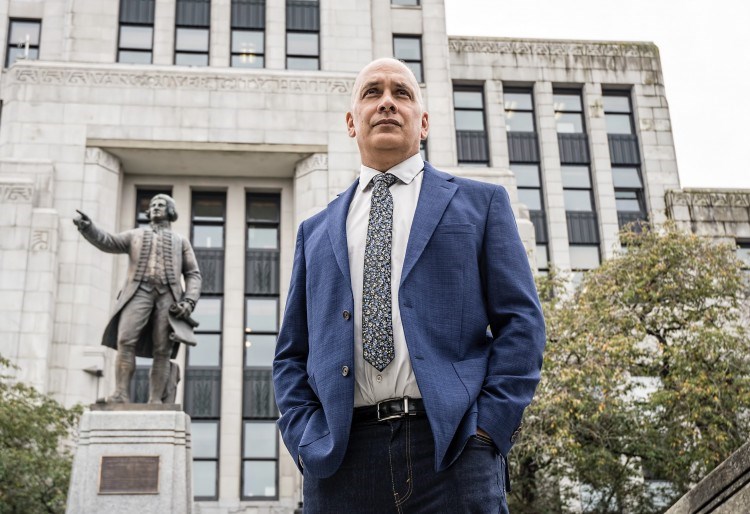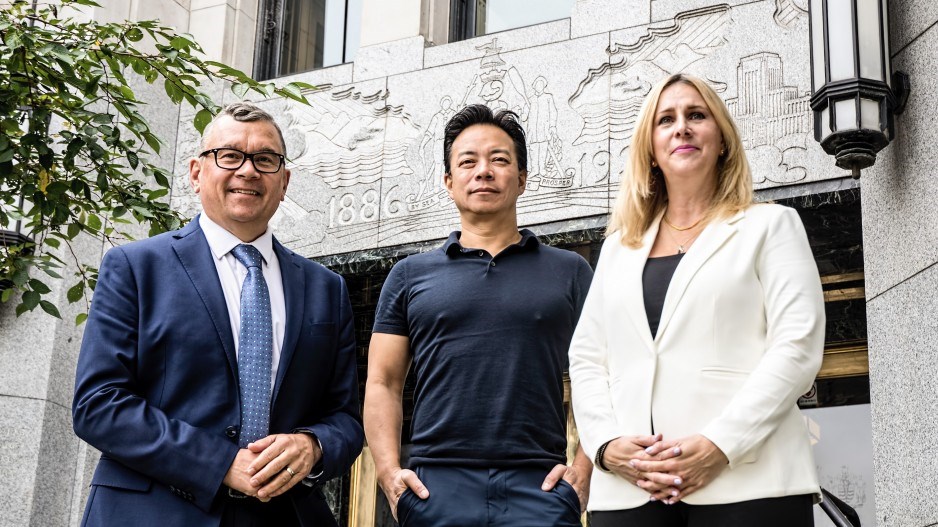Vancouver’s A Better City (ABC) party made plenty of promises that helped the party sweep to power one year ago, winning the mayor’s office and each of the seven council positions for which it ran candidates.
On some fronts, it has made progress. On others, it has work to do.
Mayor Ken Sim said during his campaign that his top priorities were improving public safety and making housing more affordable.
His biggest public-safety promise was to hire 100 police officers and 100 mental-health nurses, and he has largely delivered on that pledge.
Â鶹´«Ã½Ó³»Police Department (VPD) Chief Adam Palmer said his force had hired exactly 100 new officers this year up to Sept. 21.
VPD’s media team clarified to BIV in an email that this was a net total of 100 new officers, and that the force has 1,448 officers, up from 1,348 one year ago.
The VPD typically hires 50 to 75 officers each year to replace those who retire.
“Our applications for [new-]recruit officers are up over 50 per cent, and our applications for experienced officers, from other departments across Canada, are up over 700 per cent,” Palmer said at the Sept. 21 police board meeting.
“We’re definitely bucking the trends of many other police services across North America and our numbers are looking really good.”
The VPD plans to roll out a six-month pilot project this fall that will place body cameras on between 80 and 100 officers working in the downtown business core and the city’s northeast sector.
Sim last fall promised his team would work with the VPD to have officers start wearing those cameras.
Part and parcel with Sim’s promise to help finance the force hiring 100 new officers was for the city to help pay for 100 mental-health nurses. Those nurses in many cases would work alongside police and in some cases take the place of police on certain kinds of calls.
Council in February approved a grant of up to $2.8 million to Â鶹´«Ã½Ó³»Coastal Health (VCH) to hire nurses for expanded mental-health responses.
That amount is not sufficient to hire 100 full-time nurses, but the provincial government is likely to add funding.
VCH told BIV in an Oct. 4 email that the city’s funding has so far enabled it to hire the full-time equivalent of 9.5 mental health nurses.
Despite repeated interview requests, Sim was unavailable to answer questions about his campaign promises, and what he and his party have achieved during their first year in office.
Coun. Mike Klassen told BIV that ABC’s commitment to hire the nurses breaks new ground.
“As a municipality, we typically don’t take on health care responsibilities like that, but this was something we felt was an important requirement, given the kind of challenges we’ve been seeing and the mental health concerns that really became more prominent during and after COVID,” he said.
“We went to the provincial government and VCH and said, ‘We’re willing to put money on the table to help establish and expand these programs that have worked very well in the past.’ I think now we’re waiting for them to come back with their hiring and their headcount.”
One of ABC’s main campaign messages last year was that it intended to reverse what it considered the city’s decline into lawlessness – rampant vandalism and an increasing number of random physical attacks.
Klassen said he led an initiative in June called Â鶹´«Ã½Ó³»Beautification Day, where approximately 100 volunteers spent their day painting over graffiti in a variety of neighbourhoods across the city.
The concept behind that initiative was that removing graffiti would make the areas more welcoming, and that this would foster a livelier streetscape.
“People underestimate how important a vibrant city is, and that it supports your economy,” said Coun. Sarah Kirby-Yung. “It also creates a really great energy, and a great place to live. We can’t underestimate the power of positivity there.”
She mentioned initiatives such as increasing the city’s loan limit to $103.7 million for the Pacific National Exhibition to build a new amphitheatre. The city plans to spend $10 million in Gastown within three years to refurbish crumbling brickwork and provide other repairs, Kirby-Yung said. There will also be a pedestrian-only pilot project in that neighbourhood next summer, she added.
Kirby-Yung was instrumental in creating pedestrian-only days this summer on Granville Street, and in helping to expedite Bonnis Properties’ plan to build a 17-storey building that would include office, retail, restaurant and cultural space. The Bonnis project would also save the façade of the Commodore Ballroom, upgrade the Orpheum’s Granville Street entrance and add backstage space at that venue.
Kirby-Yung moved an amendment directing staff to refer the project’s rezoning to a public hearing, when staff had previously intended to have a “much longer-term planning exercise” on the strip, she said.
Marquis Wine Cellars owner John Clerides, who has had his Davie Street wine store vandalized multiple times, told BIV he has seen little improvement in the state of the city.
Opening a wine bar on Granville Street, therefore, is unfeasible, he said.
“Taxes haven’t gone down,” he said. “It’s not safe for my customers. It’s not well lit. The permitting process is a nightmare. Licensing is a nightmare. I could just stick my hand in a mousetrap.”
Permitting delays persist
Key to Mayor Sim and ABC’s commitment to build more housing was speeding up Vancouver’s permitting process – something that has yet to materialize.
The party’s promise – captured by the 3x3x3x1 slogan – was to improve the process so that home renovation permits could be approved in three days, single-family-home permits could be approved in three weeks and already-zoned multi-family and mid-rise projects could be approved in three months.
Permitting for high-rise projects and other larger projects would be approved within a year, according to ABC.
A year into ABC’s term, permitting delays remain about as long as they were one year ago.
The city has an online data portal that recently showed that for many building categories – duplexes, single-family homes, laneway homes – the permit wait time was approximately nine months.
“I haven’t really seen any change,” Barzelai Building principal Avi Barzelai told BIV. “It takes basically the same amount of time to get approved, whether it is a renovation or a single-family house.”
One minor improvement that Barzelai said he has noticed is that the city has streamlined some aspects of its rezoning bylaw.
Allan Diamond Architect principal Alan Diamond told BIV that he remembers it being much easier to communicate with city staff decades ago. Automated forms and emails – the norm today – can often be overlooked for months and fall through the cracks, he said.
“The email correspondence, I think, is one of the real bugbears,” he said.
“My clients want immediate responses but the people that I have to talk to in order to get that do not respond.”
Alan James Architect principal Alan James told BIV he has been frustrated with a four-year wait for rezoning approval on a six-storey affordable-rental building at First Avenue and Rupert Street.
“Four years to rezone land is really over the top,” he said.
“One thing they asked us for was a 60-year carbon assessment on the proposed building. This is for a rezoning. That is absolutely crazy. How can you do that? What if we don’t get the rezoning? We’ve already done a 60-year carbon test for a building that doesn’t exist.”
James said he is optimistic there might be some improvement following Theresa O’Donnell abruptly leaving her job as Vancouver’s chief planner in September – a departure widely seen as a dismissal.
She was not helpful in smoothing the process, he said.
Green Party of Vancouver Coun. Pete Fry, however, told BIV he is disappointed that O’Donnell left because she did everything council asked her to do.
“It leaves a little bit of disarray at a time when we’re facing some pretty significant asks,” he said.
“We now don’t have a permanent director of planning and no real strategy around where [speeding up the permitting process] is going.”

He criticized ABC’s 3x3x3x1 commitment as slick sloganeering, with little concrete policy to make the end goal achievable.
“There has not been a really coherent articulation of how they got those numbers,” he said. “Are they just catchy?”
He agreed with Diamond that city staff need to have more face-to-face interactions with those seeking permits. Having a concierge that is a one-stop place for interaction, instead of multiple places for permit-seekers to go, could also speed permitting, he said.
Fry suggested that the city use artificial intelligence and other digital tools where effective to speed processing.
Kirby-Yung admitted that the city has much work to do to speed up permit processing.
ABC takes steps on housing
Â鶹´«Ã½Ó³»city council in September unanimously passed a motion to allow builders to put up to eight homes on single-family lots in lower-density neighbourhoods.
Kirby-Yung said the city was bold in collapsing nine residential zones into a single zone.
“The more that we can simplify those regulations, the easier it will be to do some of those permits because what we are seeing is that a complexity of regulations has been one of the barriers to getting through the system more efficiently,” she said.
One thing many in the development community say would be wrongheaded is to hire more permitting staff. That is likely because they are frustrated with how many layers of bureaucracy already exist.
Â鶹´«Ã½Ó³»had 662,248 residents in 2001, according to that year’s census. That’s 93,928 – or 16.5 per cent – more residents than the 568,320 people who lived in Surrey that same year.
The City of Vancouver, however, has substantially more city workers (9,096 or at least 65.4 per cent more) than does the City of Surrey, which gave BIV a range for its headcount of between 4,700 and 5,500 people, depending on the time of year.
Those city staff calculations include parks and recreation workers and fire-rescue services workers, but do not include police or library workers.
“It’s not just about the number of staff you have,” Kirby-Yung said. “I think it is also about whether people are getting value for their tax dollars, and whether we’re seeing the impact, and results, and we’re having the right people in the right roles.”
She added that the Mayor’s Budget Taskforce is reviewing the budget to find efficiencies.
ABC in its 2022 municipal campaign did not promise to reduce taxes, nor did it say by how much it would raise taxes. Instead, Sim and his team said they would vet the city’s financial documents before making any commitments.
The team then voted to raise property taxes by 10.7 per cent, surprising many who anticipated that the new administration would be more frugal.
Fry said that while ABC may not have promised to cut spending and reduce the budget, that sentiment was “in their narrative.”
He said he now fears “some pretty reckless cuts” that could do damage.
“We’ve already seen some shoot-from-the-hip approaches, where programs and departments have been discontinued without any real explanation or strategy,” he said.
Indeed, the city on Sept. 21 released a bulletin saying that it would “immediately” wind down the Â鶹´«Ã½Ó³»Economic Commission (VEC).
That organization advocated to help grow the city’s economy and market the city’s strengths to the global business community. The plan is to bring those functions to a new business and economy office operating within the city manager’s office.
Of the 27 people who worked at the VEC, 15 were notified that their jobs would cease within four weeks. Of the remaining 12, “some may retain their roles up to mid-2024 as programs and business activities are wound down,” the city told BIV in an email. •



